-
Full Genome Report
review on January 11, 2017
by Craig Macpherson

At a Glance
Summary
Promethease is an excellent tool for getting more out of your digitized genetic data, by exploring the genetic variants that you possess. Given that 23andMe and AncestryDNA only discuss a fraction of the variants they test for, if you’ve taken these tests; Promethease is a cost-effective means of learning more about yourself using the data you already have. If you’ve gone even further and have purchased your own exome or genome sequence; Promethease is an absolute must.
I found it important to bear in mind that by using Promethease, I was choosing to interpret complex information about myself without running it by a medical professional. Many of the studies underpinning the associations between the variants I possess and their effects were nuanced, and I frequently worried about interpreting a result incorrectly. This made it a little harder to derive meaning from my results.
It should also be said that Promethease does not offer the polished interface that the likes of 23andMe does. Promethease’s Web 1.0 pages are challenging at times, and navigating my results wasn’t easy, especially when I had to go back and forth between sections.
All limitations considered, Promethease is an incredible powerful service that is chock full of features and tutorials to help you get the most out of your data. If you’re not a geneticist and it doesn’t bother you that you may only understand 30% of the information you see, I highly recommend this tool.
Full Review
Promethease is a service offered as an offshoot of SNPedia (an independently maintained Wikipedia for genetic variants). It reports on your predisposition to disease, response to medicines and genetic traits. It can process the raw data obtained from DNA tests such as 23andMe or AncestryDNA, as well as the data acquired from exome or genome sequencing.
The service has been designed to allow individuals to identify the genetic variants they possess, learn about what they mean, and access the corresponding research. Promethease appears to ‘cut out the middle man’ when it comes interpreting an individual’s genetic data, so I was intrigued to see how they approached this.
Product expectations
The Promethease homepage was a series of statements that I had to agree to to use their service. These acknowledged that I understood the reports would be based on SNPedia, that they’re deleted after 45 days, that they don’t take non-genetic factors into account, that they assume genetic variants don’t interact with each other, and that I’m encouraged to discuss my results with a medical professional.
One of the statements I was asked to agree to was so confusing that I almost gave up! It read: “I realize that most published reports about DNA variations explain only a small part of the heritability of a trait”. Promethease seemed to be saying that the research underpinning their report doesn’t fully account for the fact that genetic variants affect people differently, but I can’t be certain this is what they meant. These statements gave me the impression that Promethease was a tool for those already well versed in genetics, and it wasn’t going to be as user friendly as 23andMe or AncestryDNA.
Six sets of sample results were provided – two using 23andMe data, two using AncestryDNA data, and two using Family Tree DNA data – and these gave me a good idea of what to expect. There was also an excellent instructional video which was really detailed – anyone considering Promethease should definitely watch it before they upload their data.
Finally, I checked out the privacy policy and was reassured to learn that none of my data would be shared or sold, neither as anonymized or aggregated sets. Promethease even said they’d delete my raw data from their system within 24 hours of my upload!
Ordering Experience
After agreeing to the statements I uploaded two files; a 15 MB TXT file from 23andMe (this took less than a minute) and a 4 GB zipped VCF file from Full Genomes (which took about 40 minutes). I had been impressed to learn from the instructional video that Promethease would use both files to produce a single report.
After my two files were uploaded, I paid the $10 fee for my VCF file to be processed (it’s only $5 if you use the smaller files generated by 23andMe or AncestryDNA) and I was told that my report would be generated shortly. It was amazing to learn that Promethease can also handle files from Family Tree DNA, Genos, Genes for Good, and even tools like DNA Land!
After making the payment I received two emails: A purchase receipt and an invitation to view or download my results. I chose to download my results which took the form of a HTML file and a corresponding folder. I’d not seen results in this format before and I couldn’t wait to take a look!
The Results
Upon opening the HTML file a browser page informed me that 60,167 genotypes had been annotated which I presumed corresponded to 60,167 genetic variants. The opening page of the Promethease report is shown below:
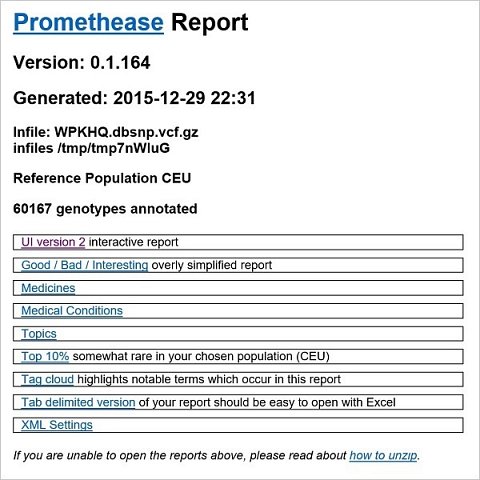
The opening page of the Promethease report.
As you can see, the report consisted of several sections: ‘UI version 2’, ‘Good/Bad/Interesting’, ‘Medicines’, ‘Medical Conditions’, ‘Topics’, ‘Top 10%’ and ‘Tag Cloud’. There was also a ‘Tab delimited version’ section, which would have been useful had I wanted to use a spreadsheet to review my variants, and an ‘XML Settings’ section which I had no idea how to use.
Results Section: UI version 2
The ‘UI version 2’ section was the core of the Promethease service and it contained a helpful tutorial. Although the tutorial explained numerous features very clearly, sometimes the feature referred to was covered rather than highlighted, which made it a little confusing. It’s also a shame that you can’t turn off the tutorial after the first time you use it, because it popped up each time I accessed this section.
UI version 2 was essentially a genetic variant database, and I could use it to search for the variants I possess using a number of filters. The key filters were ‘Topics’ (showing miscellaneous variants such as those associated to personality traits), ‘Medicines’ (showing variants associated to my predisposition to certain medications), ‘Medical Conditions’ (showing variants associated to my predisposition to certain medical conditions) and ‘Gene’ (showing variants occurring within certain genes, providing I knew the gene’s ID!). Unfortunately, there were several other elements that I didn’t understand, such as the ‘Sort by Magnitude’ filter, the ‘Require Frequency’ checkbox, and the ‘Allow 10’ setting. I reckon I understood about 30% of the functionality in this section, but it didn’t stop me from finding the variants I was interested in.
Each variant returned by a search was listed with its ID number (e.g. rs63750047), the effects attributed to it, links to SNPedia (which listed the research supporting the attributions), and technical information, some of which I understood (e.g. the ‘Gene’ the variant was associated to) and some of which I didn’t (e.g. ‘Rs time’). Here’s an example of a variant returned by a search which is associated to Lynch syndrome:
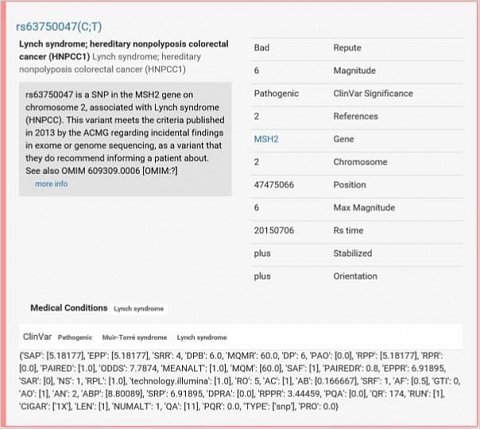
The genetic variation I possess that’s associated to Lynch syndrome.
As you can see, this variant predisposes me to an increased risk of developing Lynch syndrome, a condition associated to several solid organ cancers. The ‘more info’ link took me to the variant’s SNPedia entry which helped me learn more about the condition, and listed the other variants associated to that condition. The SNPedia entry also contained links to the relevant published research, and knowing that these studies were just one click away gave me a lot of confidence in Promethease’s findings.
I think it would be easy to be deterred by the sheer number of features in this section, but anyone could get a feel for it by using the tutorial and by playing around with the settings.
Results Section: Good/Bad/Interesting
The ‘Good/Bad/Interesting’ section didn’t contain anything that wasn’t in the UI version 2 section, but it grouped my results in a way that made the findings more manageable.
The ‘Good’ sub-section displayed the variants I possess that are associated to beneficial characteristics (e.g. resistance to a certain disease) - my top five ‘good’ variants are shown below. The ‘Bad’ sub-section displayed the variants associated to negative characteristics (e.g. a predisposition to a certain disease), but it was the ‘Interesting’ sub-section that I found most engaging; it simply listed the ‘noteworthy’ variants (e.g. those that predisposed me to an angry temperament).
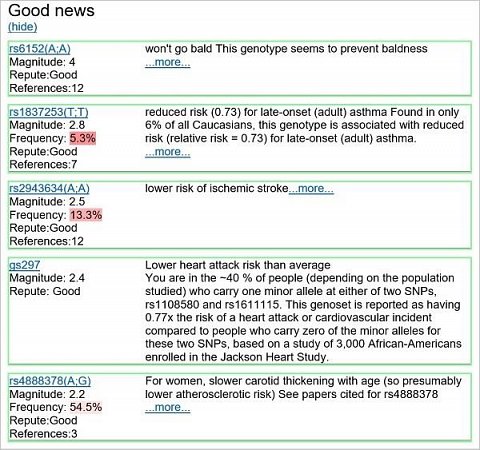
My top five ‘good’ genetic variants.
A lot less information was provided for each variant in this section which made it much easier to use than the UI version 2 section. SNPedia links were still provided, and as Promethease had included ‘magnitude’ in these results too, I decided I’d better access the help section to work out what this meant. I learned that a variant’s magnitude ranges from 0-10, where 0 means it’s completely uninteresting, and 10 means it’s really significant. This seemed to be a strange way of categorizing variants, especially as ‘interesting’ and ‘significant’ are both subjective terms.
Results Section: Medicines and Medical Conditions
These sections were lists of medicines and medical conditions respectively, and for each item listed, I was shown the number of relevant variants that I possess (provided it was one or more) with links to more information. It was great that I could search for variants by medicine or medical condition, and had there been an illness I’d been worried about or a medication I’d been taking; I would have been able to navigate straight to them. The first 30 medicines for which I possess one or more relevant variants are shown below:
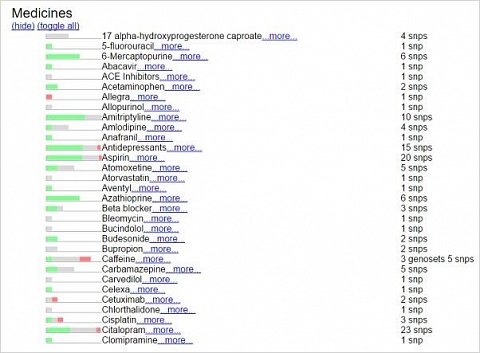
The first 30 medicines for which I possess one or more relevant variants.
The bar charts shown alongside each item indicated the proportion of relevant variants that I possess that have a good, bad or neutral association to that item. This was a neat way of helping me decide what I should focus on.
Results Section: Top 10%
The ‘Top 10%’ section listed the variants that I possess that are found in less than 10% of the population. Although some of these variants were fascinating to learn about, most of them were so rare that only the name of the gene that it had been found in was given!
Results Section: Other Sections
The ’Tag Cloud’ was one of the smaller sections in the Promethease report (shown below) and it contained the most common words found in my results. This was a fun idea but unfortunately the most prominent words in my Tag Cloud were ‘cancer’ (which was worrying) and ‘associated’ (which was meaningless).
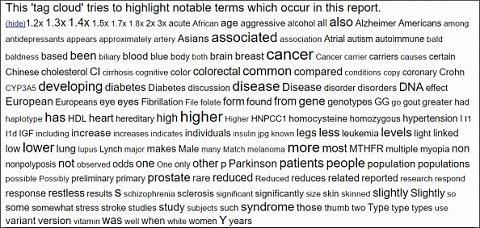
My Tag Cloud.
There was also a section that listed my variants by ‘Topic’, and it worked in a similar way to the Medicines and Medical Conditions sections. This allowed me to investigate my variants according to their associations to things like caffeine metabolism or ageing. Whilst this was a good idea in theory, I found the topics to be a bit too random to be helpful, and I’d say that the ‘Topics’ search filter in the UI version 2 section was already adequate for exploring these miscellaneous variants.
Summary
Promethease is an excellent tool for getting more out of your digitized genetic data, by exploring the genetic variants that you possess. Given that 23andMe and AncestryDNA only discuss a fraction of the variants they test for, if you’ve taken these tests; Promethease is a cost-effective means of learning more about yourself using the data you already have. If you’ve gone even further and have purchased your own exome or genome sequence; Promethease is an absolute must.
I found it important to bear in mind that by using Promethease, I was choosing to interpret complex information about myself without running it by a medical professional. Many of the studies underpinning the associations between the variants I possess and their effects were nuanced, and I frequently worried about interpreting a result incorrectly. This made it a little harder to derive meaning from my results.
It should also be said that Promethease does not offer the polished interface that the likes of 23andMe does. Promethease’s Web 1.0 pages are challenging at times, and navigating my results wasn’t easy, especially when I had to go back and forth between sections.
All limitations considered, Promethease is an incredible powerful service that is chock full of features and tutorials to help you get the most out of your data. If you’re not a geneticist and it doesn’t bother you that you may only understand 30% of the information you see, I highly recommend this tool.
Visit Promethease to learn more about this DNA testing service >


